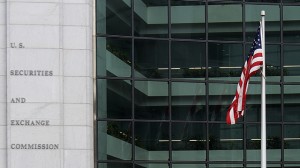At the urging of a “loose coalition of Democratic elected officials, shareholder activists and pension funds” the Securities and Exchange Commission (SEC) is considering a new rule that will require all publicly traded corporations to disclose their political donations, reports Nick Confessore in The New York Times:
The idea isn’t a new one. About 60 percent of S&P 100 corporations already voluntarily disclose that information, many in response to shareholder demands. But it would mark a major change, one that could shake up the post-Citizens United universe of dark money nonprofit groups and trade associations.A petition to the SEC asking it to issue the rule has already garnered close to half a million comments, far more than any petition or rule in the agency’s history, with the vast majority in favor of it. While relatively few petitions result in action by the S.E.C., the commission staff filed a notice late last year indicating that it was considering recommending a rule.
Even though corporations are allowed to spend their money directly on political campaigns as a result of the Supreme Court’s 2010 Citizens United decision, most have not. Instead, companies typically give money to tax-exempt groups and trade associations that aren’t required to disclose their donors. These groups spent hundreds of millions of dollars on the 2012 election alone. Earlier this month, the Chamber of Commerce and two other powerful trade associations, the National Association of Manufacturers and the Business Roundtable, issued a joint letter to the heads of Fortune 200 companies encouraging them to take a stand against increased disclosure.
And last week, House Republicans introduced legislation forbidding the SEC from making such a rule. Darrell Issa (R-Calif.), the head of the House government oversight committee, demanded copies of correspondence between the SEC and anyone else about the rule and details about how many hours the SEC has been working on it.
Mary Jo White, the newly-confirmed head of the SEC, would likely be the deciding vote on a new disclosure rule. She has been under increasing pressure from the corporate reform coalition. White, a Democrat, was working at the New York law firm Debevoise & Plimpton when she was appointed by Obama to head the regulatory agency. While at the firm, White represented several large, publicly traded corporations including General Electric and JP Morgan, and argued on behalf of her corporate clients for rules that could discourage corporate whistleblowers from coming forward. Her stance on disclosure could be a key indicator of the positions she’ll take as SEC chair. “We’re keeping an eye on her,” Steve Lonegan, director of the N.J. Chapter of Koch brothers-funded Americans for Prosperity, told The New York Times.


